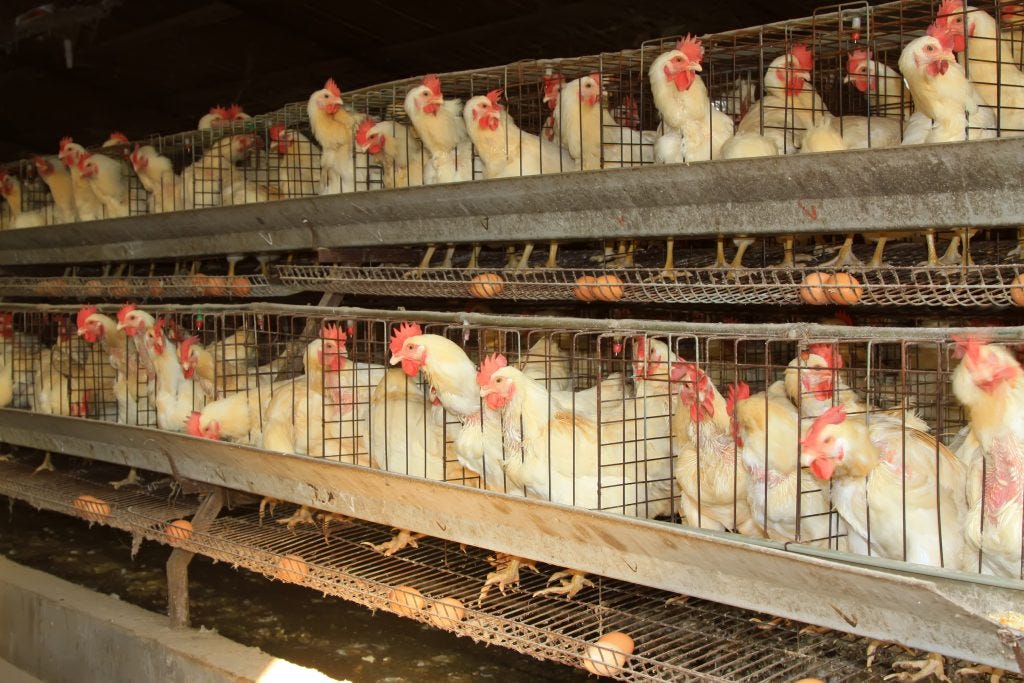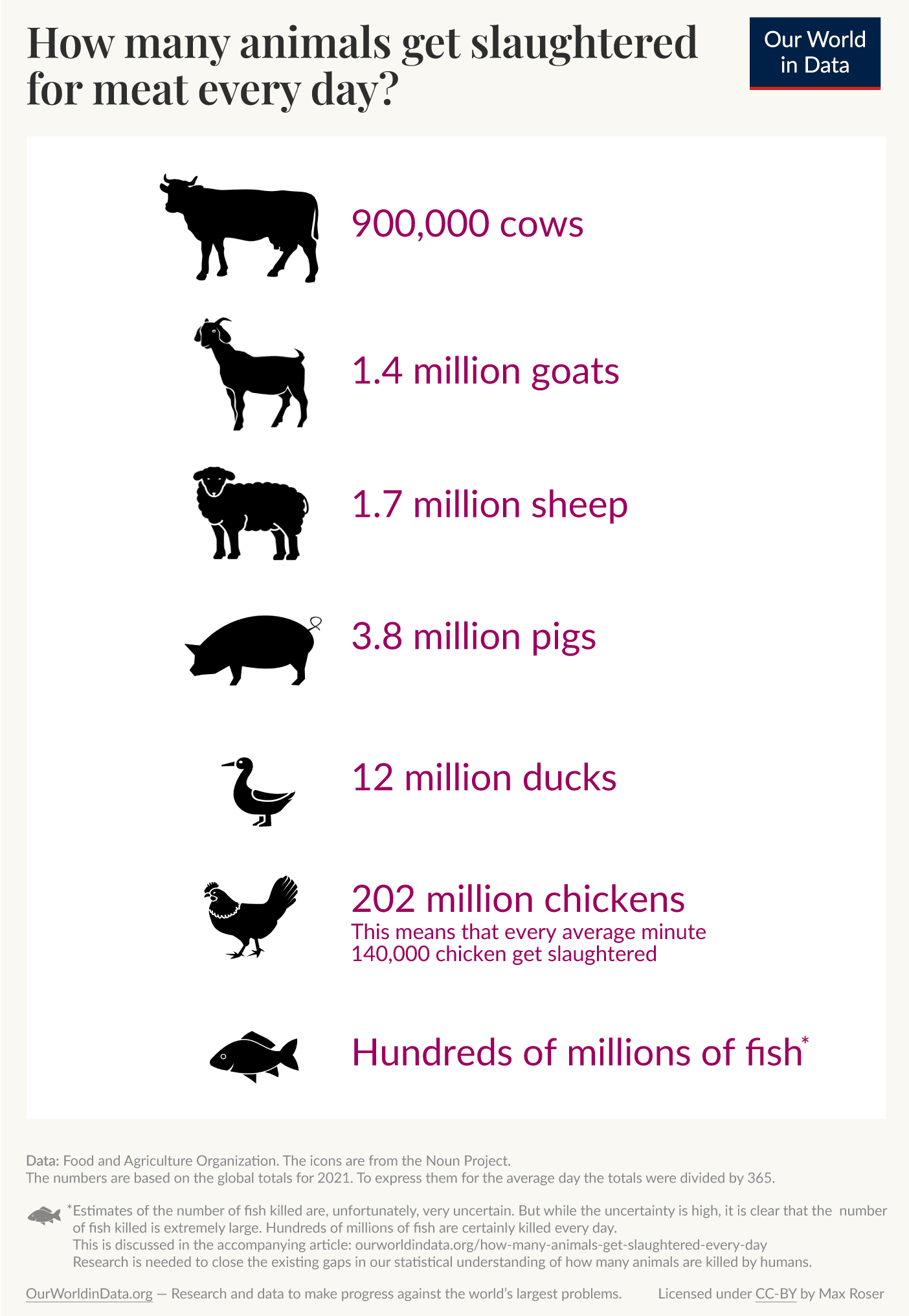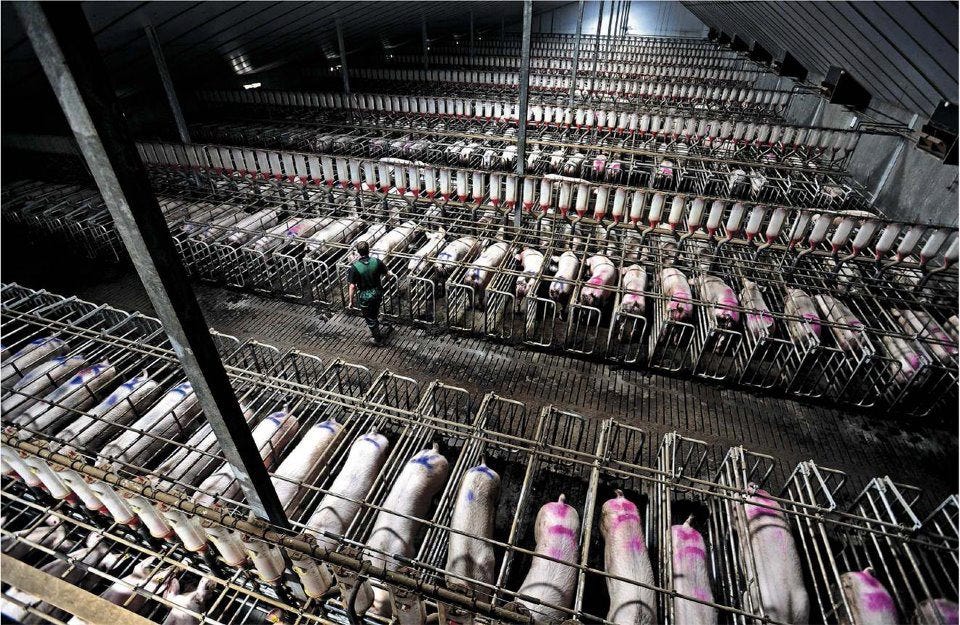The Bone-Chilling Evil of Factory Farming
By Bentham's Bulldog @ 2025-08-12T17:57 (+63)
Crosspost of my blog post.
Factory farming is evil.
I know, I know, I’ve made this point before. I’ve described, in depth, the way we treat animals. I’ve described that we stuff billions of chickens into tiny cages where they can’t turn around or flap their wings—where their frail bones are broken three times on average over the course of their brief lives, where they inhale nothing but feces deposits from the caged birds above them.

I’ve described the results of a report which estimated that egg-laying hens spend about an hour a day in distress as intense as the most intense distress most humans ever experience. That they never see the sun except immediately before slaughter—that one of the most distressing things that can happen to a hen, being unable to perch, happens to nearly all the egg-laying hens in the world.
They live in filth and acidic feces, getting horrific lung and skin conditions at alarming rates. They stand on painful wire meshing all the time. The chickens sold for meat can barely move because of their hideous sizes, and so they simply lie dormant against the wire meshing. They have no room to sleep and cruel artificial lights keep them awake, leading to chronic sleep deprivation (we call that torture when it’s done to a human). A century of genetic engineering has made it so that their mere existence causes them agony.
And that’s just a select few of the tortures we inflict annually on tens of billions of chickens. I haven’t even mentioned the pigs that we force into crates, the cows we hold down and inject with bull semen, the baby piglets slammed against concrete until their skulls crack and their brains come oozing out.
I haven’t mentioned the millions of animals boiled alive (think for a moment about what it would be like to be boiled alive—to have your skin removed by the scorching heat of water—the next time you dine on your delightful meal of chicken. One Tyson employee summarized “The chickens scream, kick, and their eyeballs pop out of their heads.”). Their tails, beaks, and horns are sliced or burned off. The chickens are dangled upside down by their legs—a process that routinely breaks their frail bones—and then slaughtered sometimes while fully conscious.
Nor have I mentioned the sexual abuse—the way that chickens, turkeys, and cows are held down and injected with semen to produce new offspring. Nor the way that when there are excess pigs (smarter than dogs mind you!) or chickens, they’re choked and roasted to death on boiling steam over the course of hours. Seriously take a moment to imagine what it would be like to slowly suffocate on boiling steam—hotter than boiling water, often reaching temperatures of 170 degrees—over the course of about an hour. Then remember that we routinely kill around 100 million birds that way, because killing them in a less torturous way would be a bit more expensive.
It’s already clear, from what I’ve said, that factory farming is torture. I didn’t even need to mention the routine starvation of millions of egg-laying hens or the cruel, overcrowded transport process where about 26% of egg-laying hens keel over and die. Nor have I mentioned the way the baby male chicks are ground up alive. I could go on until I’m blue in the face, but I think the point is clear—we treat animals like expendable byproducts and inflict on them cruelties that resemble campy horror movies in their depravity.
This is the cost of cheap meat—99% of which comes from factory farms. We don’t pay the cost with our wallet but with our soul. The rest of the cost is paid by others, with their lives.
If you enter a factory farm, multiple senses will be accosted. Your nose will be accosted by the smell of the piles of feces and ammonia that the animals are breathing in all the time. Your eyes will be accosted by the sight of dejected, miserable animals. Your ears will be accosted by their cries.
Entering a factory farm is rather like entering certain old age homes. You feel somewhat sickened by the smells and the sights. Then you feel bad. If this is what it’s like to witness it as an outsider, imagine what it’s like to be a resident. And this is to say nothing of the significantly more unsettling blood-soaked slaughterhouse where the animals are killed.
I know, I know, I’ve made all these points before. I’m not treading any new ground. But when one considers the degree of the misery, of the depravity, it can seem like a person should talk about nothing else. The problems that concern humans in their daily life begin to look rather paltry compared to this breathtaking agony—a scale of agony that plausibly annually outstrips all the suffering humans have ever experienced.
Yes, I’ve made all these points before, but since I last made it—17 days ago—about 3 billion chickens were slaughtered. 64 million pigs died in agony and terror. More total farmed animals were killed since I wrote that post than humans are alive today. Cows are far less numerous than the other animals, yet even they have perished in astonishing numbers—over 15 million have died since I wrote that article.

Extreme suffering is bad. Anyone who has been tortured, beaten, or severely hurt in some other way knows that. Its badness doesn’t go away just because the victims aren’t smart. Babies aren’t very smart, and there are some mentally disabled people whose cognitive capacities are similar to animals. No one would seriously claim that if we inflicted the grievous tortures on babies and the cognitively disabled that we inflict on animals, it would be anything other than an unspeakable atrocity. So neither can we claim that the suffering of animals isn’t a big deal because of their cognitive deficiencies.
Every year, more animals are cruelly slaughtered on factory farms than humans have ever lived. Animals epitomize the Stalinist quote “one death is a tragedy, a million is a statistic.” If someone tortures a dog in a basement, they’re universally condemned. But when the factory farms cruelly slaughter 200 million chickens every single day, no one cares much. If you complain about it, if you call it the crime that it is, you’re thought of as a nutty extremist—a vegan radical. The sane and moderate position is to look away and ignore the nightmarish holocaust that goes on every minute.
But we shouldn’t look away from the death and torment that exists on such a staggering scale that one can scarcely grasp it. We have built hell and condemned hundreds of millions of innocent beings to a fate worse than death for their entire lives, all for the crime of having flesh that tastes nice. If you wanted a definition of wickedness, a clear example to help someone grasp the concept of wrongdoing, you couldn’t do better than showing them a factory farm.

We have mechanized mass murder. We do it out of sight and out of mind, using euphemistic phrases to cover up the carnage. Our society is powered by blood and flesh and bone. As Sam Wong noted, “When humans have vanished from the planet, one of the most enduring marks of our impact on Earth will be the sudden appearance in the fossil record of copious chicken bones.”
We must reckon with this fact. The world is engaged in animal cruelty on a scale that can barely be fathomed. If you lived the life, back to back, of every organism who ever lived, you’d spend far more time being tortured in a factory farm than living as a person. To one who was forced to endure both the pleasures of meat and the suffering it causes, veganism would seem obviously obligatory, and vegan histrionics about factory farming would seem, if anything, understated.
So what should we do about this fact? I have two main suggestions.
First, we should stop paying the factory farms to torture and murder more animals. It is wrong to hurt others for trivial benefits. This is what we do when we purchase meat. We should stop doing that.
But second, and even more importantly, we should donate money to reduce suffering on factory farms. Every dollar donated stops about 10 years of factory farming. This means if you give, say, 1000 dollars, you can prevent about 10,000 years of factory farming—10,000 years of horrendous suffering. Dwarkesh Patel is currently running a fundraiser that matches donations. If you donate a dollar to the fundraiser, in total you’ll raise about 2 dollars and stop around 20 years of factory farming. This means that Dwarkesh is on track to spare animals from around 11 million years of extreme suffering.
Every day an animal spends in a cage is a horrific crime. The best days in the life of a factory farmed animal are worse than the worst day of your life. And you can prevent multiple days in a cage for a cent. If a bird would be trapped in a cage unless you paid a single cent to free it, paying to free it would be a no-brainer. And money given to Farmkind is just as good.
Please, if you can, I’d encourage you to give some money via groups like Farmkind (which Dwarkesh’s fundraiser is for) that are working to end this enduring nightmare. As usual, if you give at least 200 dollars in response to this article or at least 30 dollars a month, you can have a free paid subscription!